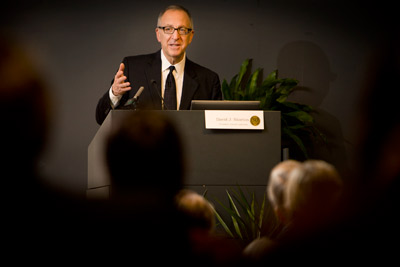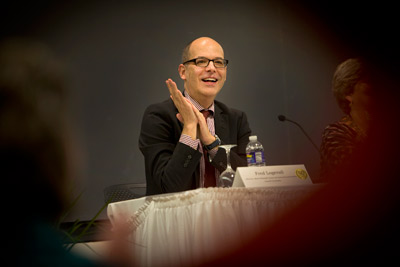Skorton reaffirms importance of Cornell internationalism at Einaudi Center anniversary
By George Lowery


The Mario Einaudi Center for International Studies will offer a postdoctoral fellowship in global affairs with a likely emphasis on security studies, Director Fred Logevall announced at the opening of a two-day symposium celebrating the 50th anniversary of the Einaudi Center, Nov. 14.
"The timing I think is right for such a program," Logevall said. "Thanks to the tremendous generosity of the Bartels family, we're now in a position to make this happen." He said plans call for two postdoctoral fellows, each of whom will teach an undergraduate course, to be on campus in the fall 2013 semester.
Logevall introduced Cornell President David Skorton, who said, "Cornell University has been international in scope and in aspiration from its very beginning" and reiterated the importance of Cornell's international dimension.
"A half century ago the Einaudi Center was created to be a coordinating hub of international studies and programs at Cornell, and over the years its mission has broadened and deepened," Skorton said. "Stimulating and supporting and coordinating Cornell's many and varied programs -- really the Einaudi Center is a very vibrant and essential part of the university, and it is a thrill to be celebrating the 50th anniversary."
He continued, "If we are to educate our students in global citizenship, we must offer them language study, an understanding of history and cultures beyond their own, and meaningful international experiences."
But "Without a clear and strategic vision of its international role, Cornell faculty, students and staff risk becoming less relevant globally at just the time when so many problems that don't recognize borders require international collaboration," Skorton said.
To clarify that vision, Skorton announced the formation of a committee "to expedite broad, but at the same time focused, universitywide discussion and planning led by faculty" about Cornell's direction in international affairs; the committee's report is due to Skorton in the spring 2012.
Skorton noted that only 27 percent of Cornell undergraduates earn credit for international experience, while far more -- sometimes half -- of students at peer doctorate-granting institutions study or work abroad. "We will immediately work toward the goal of [offering] meaningful international experience for at least half of Cornell undergraduates," he said.
In a time of diminishing resources and reduced funding from such federal entities as the National Resource Center to area studies programs, coupled with urgent problems that transcend national boundaries, Skorton said, Cornell will invest in its international efforts. "We will increase the goals for fundraising immediately, relevant to internationalization, in our current philanthropic campaign," he said.
Citing statistics for the fall 2011 semester from the Institute of International Education, Skorton said Cornell serves more than 3,800 international students from 120 countries who make up 18 percent of enrollment. "This is our highest percentage in a decade," Skorton said. "We will focus more resources on need-based financial aid for international students. It's very difficult money to come by," but funding sources have been identified.
As Cornell faces the impending wave of baby boomer faculty retirements about to strike all of higher education, Skorton said he sees a larger-than-usual role for Cornell's provosts to "identify strategic enabling areas" and recruit faculty into these areas.
Finally, Skorton said it is time to establish a formal international advisory board composed of alumni, diplomats and development professionals, the private sector and academics outside Cornell to advise on "the design, implementation and assessment of Cornell's international programs."
Skorton concluded, "I want to reiterate my pride in all of Cornell's accomplishments and my personal commitment to enhancing and expanding the international studies and international engagement at this university."
Media Contact
Get Cornell news delivered right to your inbox.
Subscribe